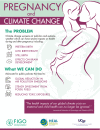Climate change, women's health, and the role of obstetricians and gynecologists in leadership
- PMID: 34694628
- PMCID: PMC9298078
- DOI: 10.1002/ijgo.13958
Climate change, women's health, and the role of obstetricians and gynecologists in leadership
Abstract
Climate change is one of the major global health threats to the world's population. It is brought on by global warming due in large part to increasing levels of greenhouse gases resulting from human activity, including burning fossil fuels (carbon dioxide), animal husbandry (methane from manure), industry emissions (ozone, nitrogen oxides, sulfur dioxide), vehicle/factory exhaust, and chlorofluorocarbon aerosols that trap extra heat in the earth's atmosphere. Resulting extremes of weather give rise to wildfires, air pollution, changes in ecology, and floods. These in turn result in displacement of populations, family disruption, violence, and major impacts on water quality and availability, food security, public health and economic infrastructures, and limited abilities for civil society to maintain citizen safety. Climate change also has direct impacts on human health and well-being. Particularly vulnerable populations are affected, including women, pregnant women, children, the disabled, and the elderly, who comprise the majority of the poor globally. Additionally, the effects of climate change disproportionally affect disadvantaged communities, including low income and communities of color, and lower-income countries that are at highest risk of adverse impacts when disasters occur due to inequitable distribution of resources and their socioeconomic status. The climate crisis is tilting the risk balance unfavorably for women's sexual and reproductive health and rights as well as newborn and child health. Obstetrician/gynecologists have the unique opportunity to raise awareness, educate, and advocate for mitigation strategies to reverse climate change affecting our patients and their families. This article puts climate change in the context of women's reproductive health as a public health issue, a social justice issue, a human rights issue, an economic issue, a political issue, and a gender issue that needs our attention now for the health and well-being of this and future generations. FIGO joins a broad coalition of international researchers and the medical community in stating that the current climate crisis presents an imminent health risk to pregnant people, developing fetuses, and reproductive health, and recognizing that we need society-wide solutions, government policies, and global cooperation to address and reduce contributors, including fossil fuel production, to climate change.
Keywords: advocacy; climate change; education; environment; reproduction; women's health.
© 2021 The Authors. International Journal of Gynecology & Obstetrics published by John Wiley & Sons Ltd on behalf of International Federation of Gynecology and Obstetrics.
Conflict of interest statement
The authors have no conflicts of interest.
Figures


References
-
- Sillmann J, Hawkins E & Forster P et al. Intergovernmental Program for Climate Change (IPCC) Sixth Assessment Report. August 2021. Accessed September 27, 2021. https://www.ipcc.ch/assessment‐report/ar6/
-
- World Health Organization . Climate change [website]. Accessed September 27, 2021. https://www.who.int/health‐topics/climate‐change#tab=tab_1

